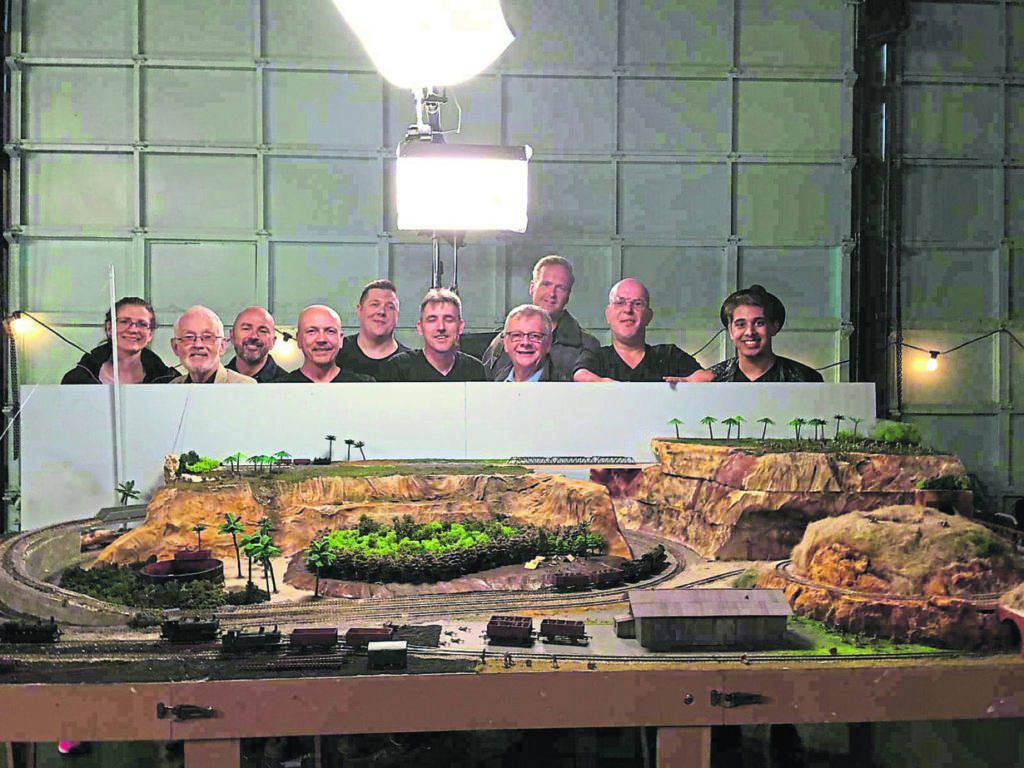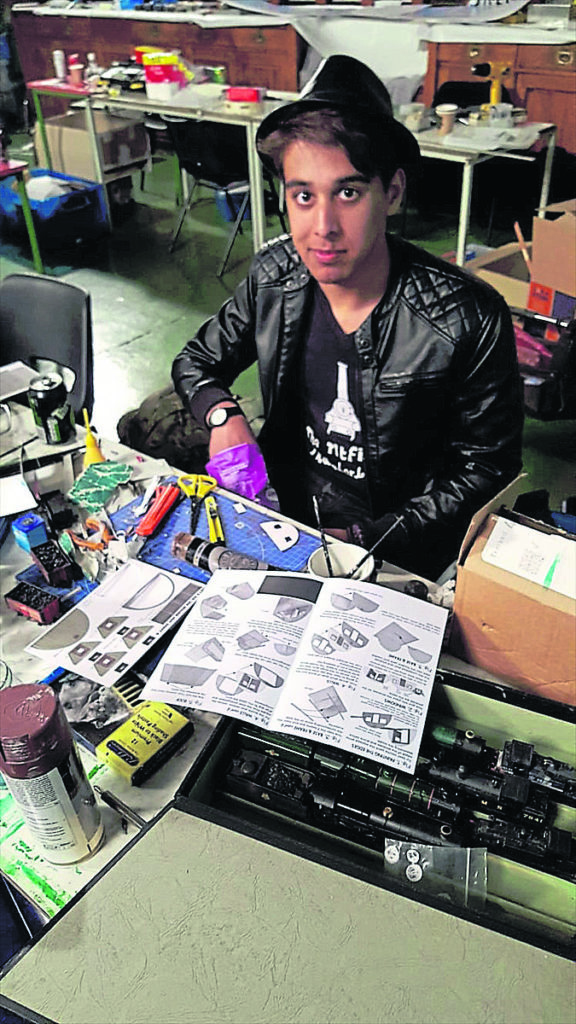Ever wondered what it would be like to take part in Channel 5 TV’s Great Model Railway Challenge? Andrew Brewin, proprietor of A2B Model Railways of Matlock Bath, Derbyshire, who did so as part of the ‘Titfield Thunderbolts’ team in the 2019 series, recounts his experience and tells us about some of the things the TV audiences did not get to see!

It all began with a Sunday evening car journey down to Reading, where the production team of The Great Model Railway Challenge had booked a hotel, but it was after 9pm before the whole team could meet in the same room.
Team captain Kevin Spurrier, along with Andy Cheers, David Lloyd and myself, had all come together in my A2B shop during some pre-filming in April, and there had also been a meeting during a pre-build in Andy’s workshop in Glossop.
Enjoy more Rail Express Magazine reading every month.
Click here to subscribe & save.
The youngest and eldest members of the team were joining us for the first time. The Rev David Stafford had returned from his globe-trotting work aboard a cruise ship, and the youthful Harun, complete with leather jacket and trilby hat, reduced the average age considerably.
Behind the warm greetings all round, though, was a dawning realisation of what we had taken on!
Day One
The 8.30am start at Fawley Hill was preceded by a wet rush-hour drive, but the heavy rain meant that the ‘walking-in’ shots had to be postponed, so the initial greeting was filmed, then filmed again and again, as the presenters tried to impress with their supposedly ad hoc puns, before work could begin. Finally, we were waved away to get started – or so we thought!
Part of our layout design required the baseboard to be cut away so that the dock scene could be created. Andy set to work with his power tools, only to be told to stop making noise while filming took place elsewhere. This became the trend for the day, with constant stoppages and requests for quiet while other layouts were filmed, and it became quite frustrating.
In between the stoppages, we beavered away laying the remaining track. Only two of three boards could be touched during the pre-build, so the final parts of the ground-level loops were laid. Several of us set to work on fitting the various feed wires, but unfortunately there was no real plan or direction, so the under-board wiring soon resembled a rats’ nest and would cause problems later. We ran out of wire, and Kevin had to go and beg extra supplies from a rival team. Not a good start!
The original track plan had been altered to include the infamous flyover, or ‘ski-jump’ as Steve Flint branded it, but getting it to sit correctly on a curve caused David Lloyd so many problems that by the end of day one it had not been completed, and the track had gone largely untested – something that the production team was quick to point out. David was looking particularly tired and stressed.
Halfway through day one I left the track-laying team – it was becoming a case of too many cooks – and started on the scenics. Large sheets of Celux insulating material were cut and glued to the rear of the board to resemble the cliff faces at the back of our jungle scene. These were cut and carved with a kitchen knife, and done outside in the rain. The Fawley Hill staff were not too impressed by the mess, which threatened to become a poisonous snack for the local peacock population!
The next job was the construction of the volcano in the centre of the helix. This was created from a combination of stacked-up pieces of polystyrene and balls of screwed-up newspaper covered in plaster bandage, and attracted quite a lot of attention from the camera crew who filmed an extensive ‘how to’ piece as I created it. Once dry, it was draped in a liberal covering of hanging-basket liner, and was finished by the end of the first day.
Day Two
The discussion in the bar on the previous night had focused on the need to get the flyover completed so that trains could be tested and David could get his sanity back! Things progressed slowly and in frustration there were some cross words between Kevin and myself over the number of people deployed on the project. It was not quite a mutiny, but I was determined to get the scenic work finished, so set to work on cutting more of the insulating material to complete the cliff faces.
Harmony was soon restored and Kevin taught me the finer art of airbrushing, allowing the detail to be built up. Things now seemed to be progressing and David even got the flyover finished. There was a great deal of satisfaction when a model loco successfully ran over the track and down the slope with no problems.
Our luck seemed to be turning – but it didn’t last long!
As with day one, there were more frustrating stoppages to avoid making background sounds during filming on other layouts, and one of these put a halt to the airbrushing. The paint managed to dry and harden during the long break, the airbrush stopped working and the captain had to be taken away from the layout to clean and repair it.

As with the other teams, we then lost another member, young Harun, to the ‘Scratchbuild Challenge’. He looked like a rabbit in headlights when Tim handed him a tambourine, plastic sword and shuttlecock, but fortunately Andy Cheers and I had bounced a few ideas around and he implemented them brilliantly, the shuttlecock becoming a wigwam, the sword adding bridge parapets to the flyover and the tambourine being turned into a septic tank that filled a hole in the centre of the board. The latter was a real work of art, and deservedly Harun won the competition.
It was another lift, and we needed every lift possible.
However the problems just kept coming, and a short circuit took half the day to resolve. Everything was checked and double-checked and the wiring pulled apart and re-done, but nothing seemed to fix it. Suddenly, I had one of those horrible realisations. It was my fault! Some of the metal foil protective sheet on the insulating material would not peel off, and there was a chance that some of this could be fouling the track in the dead-end tunnel on the middle level. After some quick work with the track-cutting saw all was fixed – but not before the cameras swooped like bees around a honey pot. I was so pleased that it didn’t make the cut!

The electrical problems meant that we headed for the hotel with massive gaps still in the middle of the board. We were so far behind the other teams, an embarrassing result was staring us in the face and the mood was sombre.
Day Three
A few beers in the bar the previous night gave us renewed determination, and an early start to the final day produced some frantic work. The board was cleared of junk and the Rev David’s jungle scene was put in place – a work of art that filled a large space. The two Davids got to work finishing the dock area, covering vacant areas of board with a liberal covering of lichen to extend the jungle scene, while I picked up the repaired airbrush and completed the cliff face, before tackling the army camp scene featuring Andy Cheers’ superb pre-constructed building. This was finished off with some Metcalfe Tarmac sheets and static grass applied from a Gaugemaster puffer bottle.
Things were coming together, but there was still time for further disasters. First, someone dropped the pre-built Tiger Moth aircraft model, leaving Harun with a frantic rush to repair it, and then we had issues with the helix. The model locomotive kept derailing – it was clear that some of the track had expanded under the heat of the lights and had gone out of shape – but despite lots of tinkering we could not get things to work consistently before time ran out. All we could do was hope and pray!
We were the last to present to the audience and the nerves were jangling. Everything started well, with the Tiger Moth, patched up and delicate, descending the wire perfectly into its crash landing, hitting the lichen in a cloud of talcum powder smoke blown through a tube by David, who was hiding under the board. The judges were impressed, and cast admiring glances at Kevin’s wonderful sunken pirate ship along with the volcano, which smoked liberally at the front of the layout.
The N-gauge locomotive travelled faultlessly across the rear of the layout before disappearing into a tunnel. The German soldiers were transported around the layout, safely traversing the flyover and ‘ski-slope’ as a few smug looks were cast in the direction of Steve Flint, who was happy to admit he was wrong!
There is a saying, though, that pride comes before a fall. The British soldiers followed around the layout behind ‘Lord Nelson’ 4-6-0 Sir Francis Drake and stalled! Lack of time had prevented a thorough track clean, and both locos stalled further, requiring help from the big finger in the sky! Then the ‘Jinty’ emerged from the tunnel and began the descent of the helix. The many prayers uttered under our breath went unanswered and the loco derailed – twice – before stalling as it headed towards the dock to finish the display.
We didn’t need to wait for the results to know that we hadn’t won! The winners were worthy ones and we were happy to congratulate them and wish them well for the rest of the contest. The irony was that the layout ran perfectly for the rest of the day and we were left with a feeling of what might have been.
So what now? The layout was dismantled after the heat, but there are plans to build a new one for exhibition purposes. With the team being spread so far apart, it will prove a challenge, but we hope to get it done. We have all become firm friends and know each other’s skills and reckon we could do better next time – and we’d love another crack at the show!




